What happened to the independence referendum alliances?
- Published
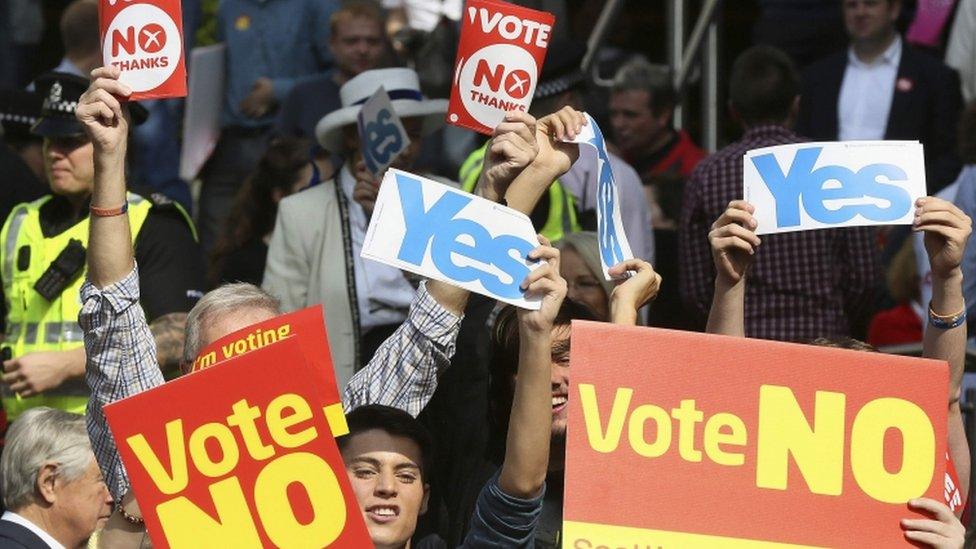
What happened to the Yes and No teams formed during the 2014 referendum campaign?
Whatever happened to the allegiances formed during the run-up to the independence referendum? Are they at all evident in this Holyrood election campaign?
The answer, simplistically, is no. But the underlying reasons for that blunt answer perhaps help explain trends in contemporary Scottish politics.
Firstly, consider Yes Scotland, the pro-indy umbrella. There was a dominant party: the SNP. Dominant numerically, dominant financially, dominant organisationally.
But there were others involved. Grassroots teams which ended up playing significant roles in different ways.
For my present purpose, though, I am interested in the political parties which took part in Yes Scotland: the Greens and the Scottish Socialist Party (now morphed into RISE).
Is there any sign of co-operation, collaboration or even fellow feeling at these elections? There is not. Indeed, there were evident strains during the campaign itself.
For example, when the Greens contemplate their current relationship with the SNP, they talk not in terms of fellow independence supporters. They talk of a Green phalanx at Holyrood refocusing the SNP and robustly challenging their economic programme.
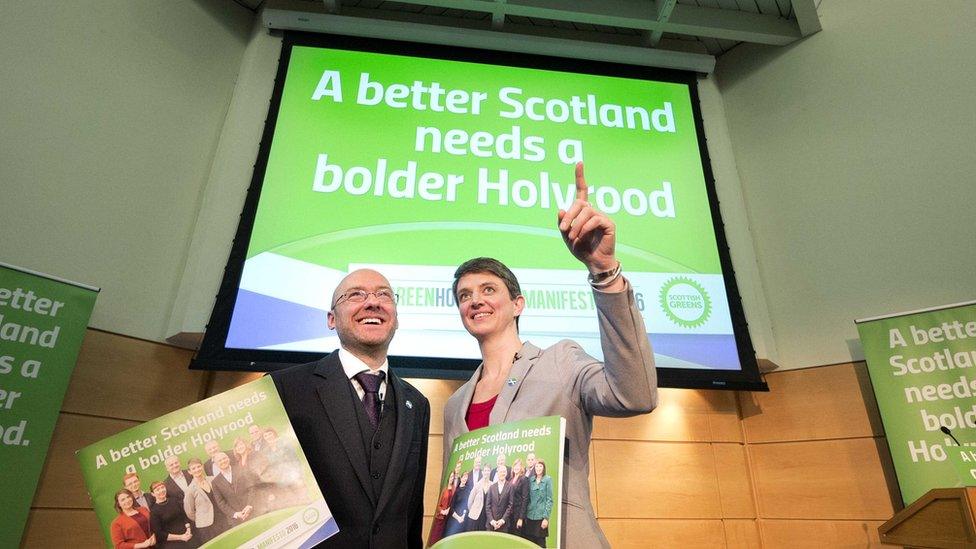
The Greens have promised to challenge the SNP's programme on matters other than independence
In return, do the SNP even hint that they might, to a tiny degree, favour a Green presence over others at Holyrood? Remember that Nicola Sturgeon said that, in England, she'd vote Green.
Friends, they do not. Indeed, Ms Sturgeon's party has gone out of its way to stress that they want folk to cast both their votes for the SNP, regardless of claims that such behaviour might allow supporters of the Union to advance under the Scottish voting system.
'Both votes'
Every speaker at the party conference concluded their speech with: "Both votes SNP." The message was flashed throughout the pre-launch movie which warmed the crowd up for Nicola Sturgeon's arrival when the SNP published their manifesto on Wednesday.
Now, that is partly the natural zealousness of any political party which fears even the smallest seepage of support. It is partly strategic: generally, you don't talk up an opponent.
But, also, it is because this election is decidedly not a rerun of the referendum. It is being fought on the economy, on public spending, on tax, on competence, on experience. Not independence.
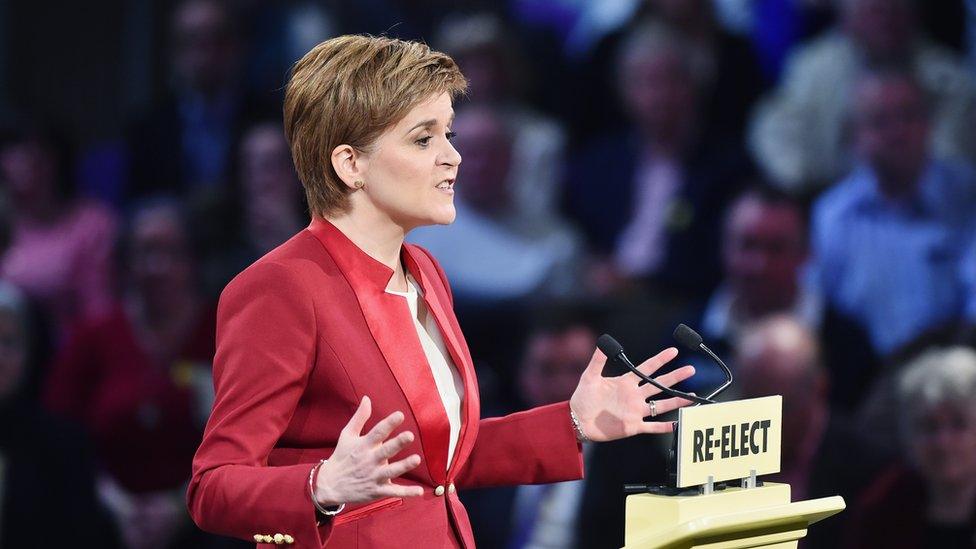
Nicola Sturgeon has gone out of her way to stress the "both votes SNP" strategy
So absolutely no favours for the Greens or any other pro-independence grouping from the SNP. Indeed, given the sharp contrast between the Greens' tax policy and their own, the SNP might well find other company in Holyrood more congenial and collegiate.
So much, so evident. But consider the other grouping from the referendum, Better Together. Is there any sign that their relationship has persisted through to this election.
Once again, absolutely not.
Why? For two primary reasons. One, both Labour and the Liberal Democrats are running several lang Scots miles away from their previous association with the Tories, which they regard as damaging to their electoral prospects.
For another - or perhaps, a nuanced version of the first reason - neither Labour nor the Liberal Democrats has chosen to major on the issue of independence at this election. Only the Tories have made much of their offered determination to resist the prospect of a second referendum.
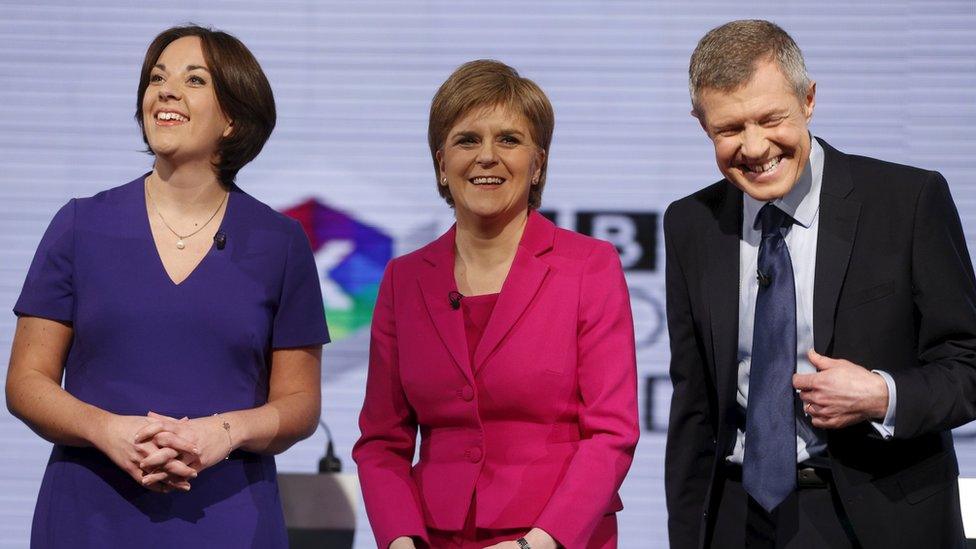
Labour and the Lib Dems have not teamed up to fight the SNP over independence in the current campaign
To be absolutely clear, that does not mean either Labour or the Lib Dems want or favour indyref2. They resolutely do not. But they choose not to major on that topic in their own selected offerings to the voters, via the wicked media.
Bear in mind that this is a change of emphasis from previous elections. In earlier contests, all the parties which supported the Union could be counted upon to equate a vote for the SNP with a vote for independence and to counsel strongly and daily against both.
Now, only the Tories are doing that with any verve or any conviction. Why? It is a question of electoral advantage.
The Tories see a potential electoral gain for them in seeking to corral a sizeable chunk of the 55, those who voted No in the referendum. If you want the Union - really want it - then vote Unionist, they argue. The clue, they say, is in their name.
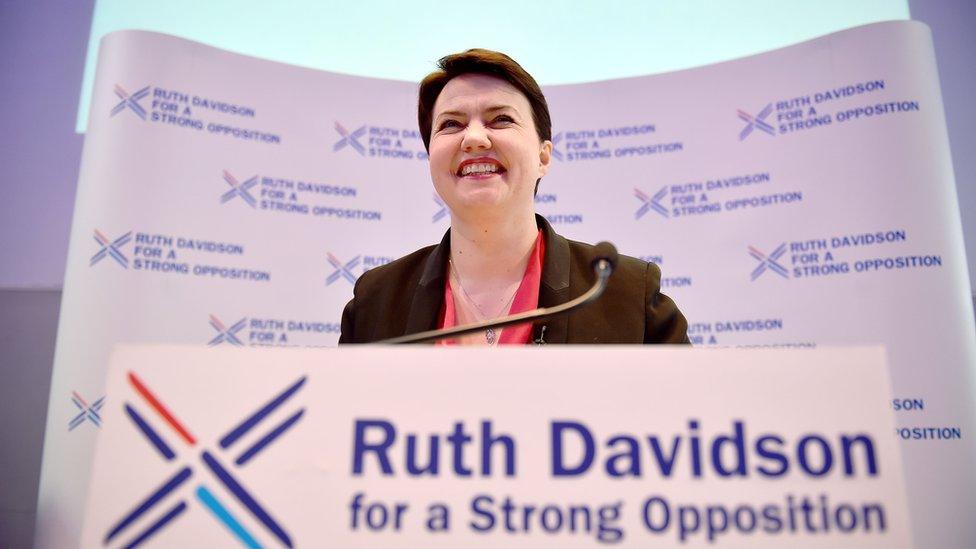
The Tories alone have been openly chasing No voters in the election campaign
So why don't the others do the same? See above. If Labour and the Liberal Democrats try to turn this into a campaign against independence, they risk reviving their Better Together association with the Tories by default. And they risk electoral anger as a consequence.
Labour candidates confide that the contumely they encountered last year has largely evaporated: the "Red Tories" taunts have declined. Doors are no longer slammed - although they are perhaps not yet thrown wide open in welcome.
They get, at least, a hearing. Neutral, rather than hostile. Note neutral: not necessarily positive. But they do not want to jeopardise what they regard as a gain by reviving memories of their role in the referendum - and their chums at the time.
Better Together? What's that?
That is why, I believe, Labour has taken a conscious decision to focus on tax and spending, rather than the constitution. To major on the economy, not independence.
Post election, depending on outcome, they may seek to revisit their stance on added powers and the constitution. But not now.
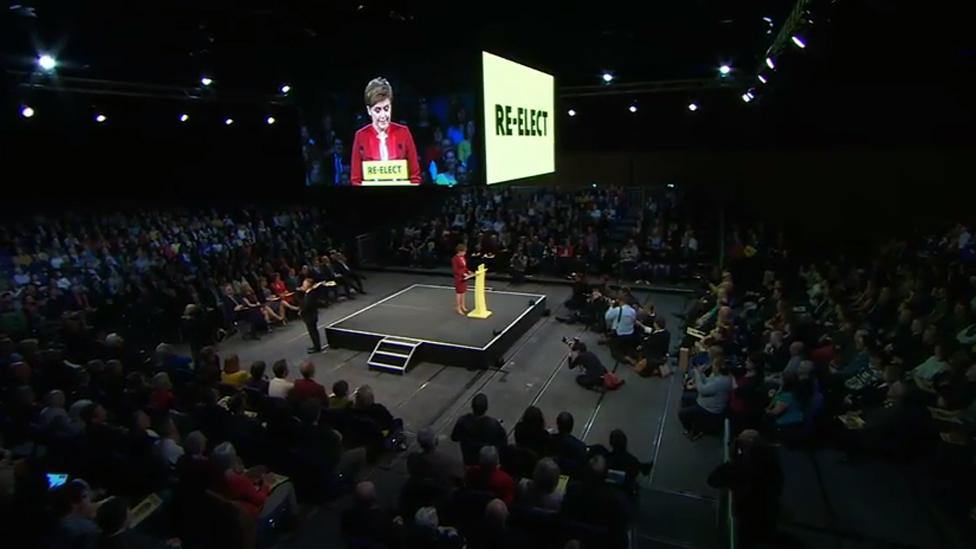
The SNP's pitch at this election is all about Nicola Sturgeon, not independence
What's more, the SNP leadership is playing the same tune. As noted previously on this site, Nicola Sturgeon was cheered voluminously for every mention of independence when she launched the manifesto.
But then she was speaking to the deeply, deeply committed. That is not remotely the primary message on the doorsteps. That is about the deployment of devolved powers, both extant and to come.
It is about experience in government. It is a personal pitch by Ms Sturgeon. It is not about independence.
Does that mean she has jettisoned or sidelined her party's core aim? Not for a second. She, they, yearn for independence.
But remember that the manifesto does not contain a specific promise of a further referendum. Such an eventuality is cocooned in caveats.
Which means, for now, for this election, Scottish politics is primarily about devolved powers. New devolved powers. It is about tax.
- Published20 April 2016
